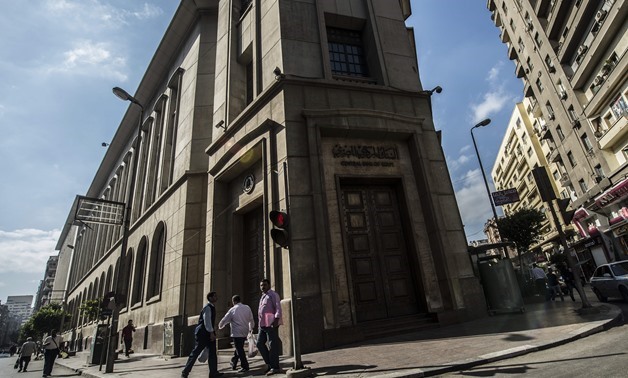
FILE - CBE
CAIRO – 27 September 2018: Expectations of the Monetary Policy Committee’s (MPC) meeting on Thursday regarding interest rates are going towards keeping the rates on hold, despite high global interest rates, events in emerging markets, existence of foreign investors, domestic inflation rates and initial public offerings on the bourse which require attracting investors.
In 2016, Egypt announced the launch of the government’s IPO program to offer shares over three to five years in several state-owned companies in fields such as petroleum, services, chemicals and real estate.
The state’s IPO program comes in light of the economic reform program adopted by Egypt and is conducted under the supervision of the Ministry of Investment.
It targets to offer 15-30 percent of stakes of some state-owned companies on the stock exchange (EGX), to increase the funding to Egyptian companies and maximize the benefit from state assets.
It will also serve as a main tool to attract local and foreign capital flows to Egypt.
In the same context, Ministry of Finance cancelled four auctions of treasury bonds after investors asked to raise interest rates.
Egypt targets average interest rates on the government’s debt instrument reaching 14.7 percent in the current budget, compared to an expected average of 18.5 percent in 2017/2018 budget.
“The required return rates were not within logical limits and did not reflect the good economic and financial performance or the improvement of Egypt’s credit rating, but were affected by the risks associated with the emerging markets,” the ministry noted upon the second cancellation.
Inflation
Egypt has faced inflationary pressure since June as a result of implementing the economic program coinciding with Islamic events, Ramadan, Eid Al-Fitr and Eid Al-Adha.
The Cabinet announced on June 16 lowering the fuel subsidy to 25 percent, after cutting electricity subsidies on June 12, raising prices by an average of 26 percent in the fiscal year 2018/2019 that began in July.
In August, Egypt’s annual consumer price inflation fell to 13.6 percent, compared to 33.2 percent in the same month of 2017.
The Central Bank of Egypt (CBE) announced that the country’s core inflation -excluding food and energy prices - rose to 8.83 percent in August from 8.54 percent in July.
Global interest rates and emerging markets
As per emerging markets, Argentina and Turkey are facing currency crises, which led Argentina’s central bank to set interest rates at 60 percent.
The Central Bank of Turkey also raised its benchmark interest rate by 625 base points to 24 percent on September 13, 2018.
With the downtrend of currencies in these countries, in addition to the hike of their interest rates, foreign investors would like to exit other markets and enter these countries' markets.
China’s central bank left interest rates unchanged on Thursday in response to the US Federal Reserve’s overnight rate increase.
Fed policymakers lifted the benchmark overnight lending rate by a quarter of a percentage point form 2.00 percent to 2.25 percent.
Currencies
In Argentina, the currency devaluated by 70 percent with 60 percent interest rates, turning the country into an attractive investment destination.
In Turkey, the lira lost more than 40 percent of its value since the beginning of 2018.
Foreign investment is drawn to higher interest rates, in addition to the increasing demand and value of the country’s currency.
Research associations and investment banks
HC Securities & Investment expected that the Monetary Policy Committee (MPC) will keep rates unchanged in the fourth quarter of 2018, with anticipations that inflation will hit 14.8 percent from September to December.
Equity Analyst – Macro & Banking Sector at HC, Monette Doss, said that HC does not expect high interest rates offered by other emerging markets to reflect on higher corridor rates since attracting domestic liquidity is not the main target at the moment.
“The rapid pace of inflation may ease after September, when the impact of economic reform measures is fully absorbed. These reform measures are fully reflected in the prices of goods and services,” the report noted.
Head of Research at Pharos Investment Bank Radwa el-Swaify expected that the central bank will fix interest rates in the next meeting, noting that if the emerging markets are stable, the interest rate may be cut by 1 percent in the fourth quarter of this year.
According to Enterprise, CI Capital’s Hany Farahat and Beltone Financial’s Alia Mamdouh hold similar views, suggesting that CBE will keep rates high to mitigate outflows from government bonds and treasuries and to curb rising inflation.
Pharos anticipated that the monetary policy easing will be more cautious to avoid outflows of portfolio investment as a result of the rise of the dollar against emerging-markets' currencies, causing further global sell-offs in emerging markets.
It also added that the levels of interest rates at other emerging markets such as Argentina and Turkey put more pressure on the CBE.
In August meeting, the Monetary Policy Committee (MPC) of CBE kept interest rates unchanged for the third time this year, setting the overnight deposit rate and the overnight lending rate at 16.75 percent and 17.75 percent, respectively.

Comments
Leave a Comment